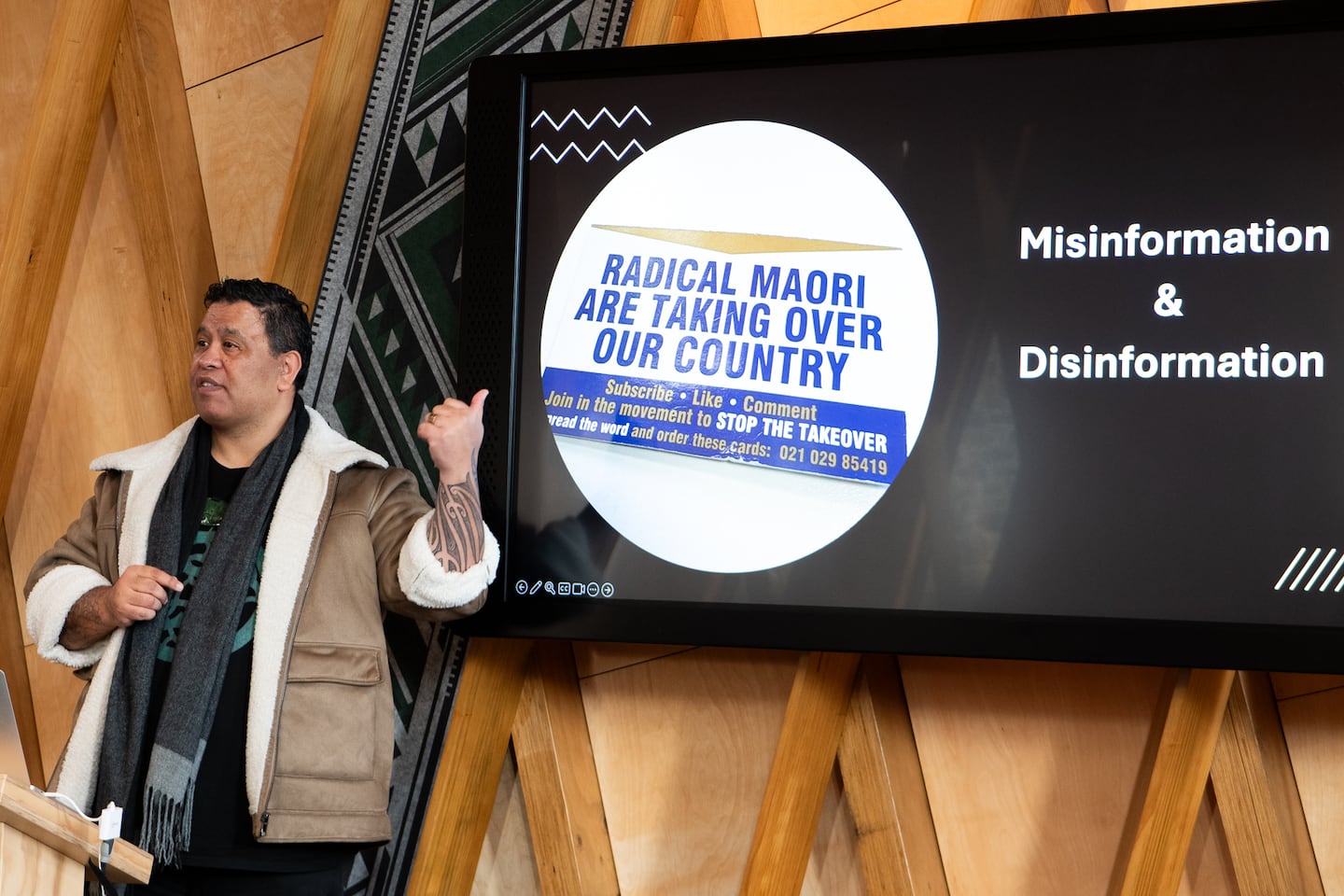A bid to retain Māori representation at Taranaki council tables kicked off on the weekend with a call for whānau-level pushback against what campaigners say is deliberate disinformation.
Speakers at Saturday’s organising meeting also warned referendums on Māori wards across New Zealand would spark vitriol – and potentially worse.
New Plymouth councillor Dinnie Moeahu called the hui, saying misinformation was causing misunderstanding and fear, while disinformation was dividing communities.
He represents New Plymouth’s five-councillor ‘at-large’ ward, having topped the poll with general roll voters in 2022.
Likewise, he said, anyone could stand in a Māori ward to be elected by Māori roll voters.
“Non-Māori can also stand in the Māori ward seat. Ōrite: it’s the same.”

Moeahu said opponents were incorrectly labelling Māori council seats as ‘race-based’.
Māori wards were Treaty-based, he said: created to ensure effective representation and help meet Crown obligations under Te Tiriti o Waitangi, as spelled out in the Local Government Act.
Almost all Māori wards and constituencies face being extinguished via referendum at October’s local elections, including those at Taranaki’s four councils.
The Government changed the law a year ago, requiring binding polls on local Māori seats to fulfil National’s coalition deals with Act and NZ First.
They said the change was to restore democracy to communities on a significant change to local democracy.
Moeahu said anti-Māori groups were ready with a campaign labelling the wards race-based as soon as the Government reintroduced referendums last July.

“It was well-resourced, it was strategised superbly and executed with perfection – and less than 24 hours after the law received Royal Assent.”
Andrew Judd won New Plymouth’s mayoralty in 2013, standing down at the next election after his unyielding support for a Māori ward drew persistent, often public abuse – including of his children.
Judd said he predicted more of the same from opponents of guaranteed Māori representation.
“My intel is that they are well geared-up, and they are going to be ... destructive,” said Judd.
“Because their hatred is real – and we cannot let hate win.”
Moeahu said the escalating risk of physical threat prompted him and councillor Te Waka McLeod to agree he’d accompany her to public meetings till the election ends.
McLeod is the first councillor for NPDC’s new Te Purutanga Mauri Pūmanawa ward.
Despite attracting online and in-person abuse, McLeod said she’d been supported by fellow councillors and staff, and the council was building stronger relationships with hapū.

She said supporters from all communities must help family members better understand Māori wards with accurate information.
“It’s having those conversations with your nana, with your grandma, with your uncle at your whānau kitchen table,” she said.
“They may be sitting on the fence and they just need to hear a little bit of truth.”
Other speakers included Labour MP Glen Bennett and NPDC councillors Amanda Clinton-Gohdes and Sam Bennett, who’s running for mayor.
Moeahu plans more meetings to galvanise helpers ahead of a public event when voting gets underway.
Referendums must be held by 37 district and five regional councils.
No other type of ward can be voted down.
At the meeting, Margy-Jean Malcolm told LDR it was crucial to have clear information.
“This is actually institutional racism, when we treat Māori wards differently from say a rural ward or any other ward.
“We don’t give the entire population a vote as to whether those wards should exist or not.”

Lance Mepham had seen candidates pushing misinformation.
“I went to a few meetings here recently, and I was really surprised at the rhetoric and just some of the nasty things that were being said about the Māori ward.”
He said Māori brought good things to the table for everybody.
“Economic and also cultural contributions - there’s just so much that Māori can give and offer this community.”
EJ Barrett said the wards had already boosted Māori participation in local democracy by 22 percent.
“My children are Māori so I have a vested interest to make sure there’s always going to be a space for them in representative democracy – and so they can see themselves in democracy.”
“It’s just the right thing to do, mate.”
LDR is local body journalism co-funded by RNZ and NZ on Air



